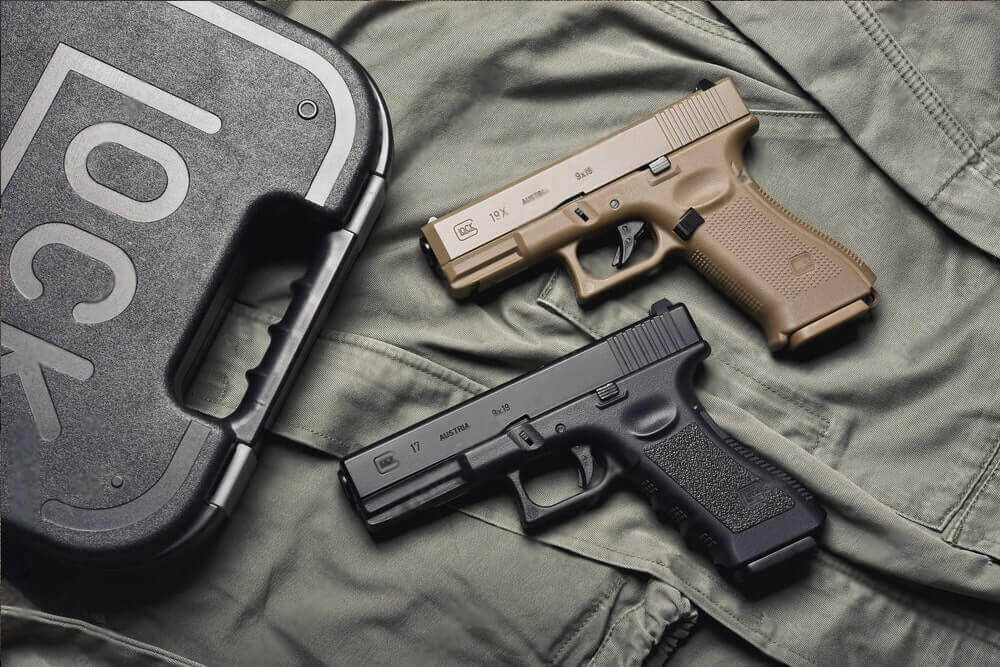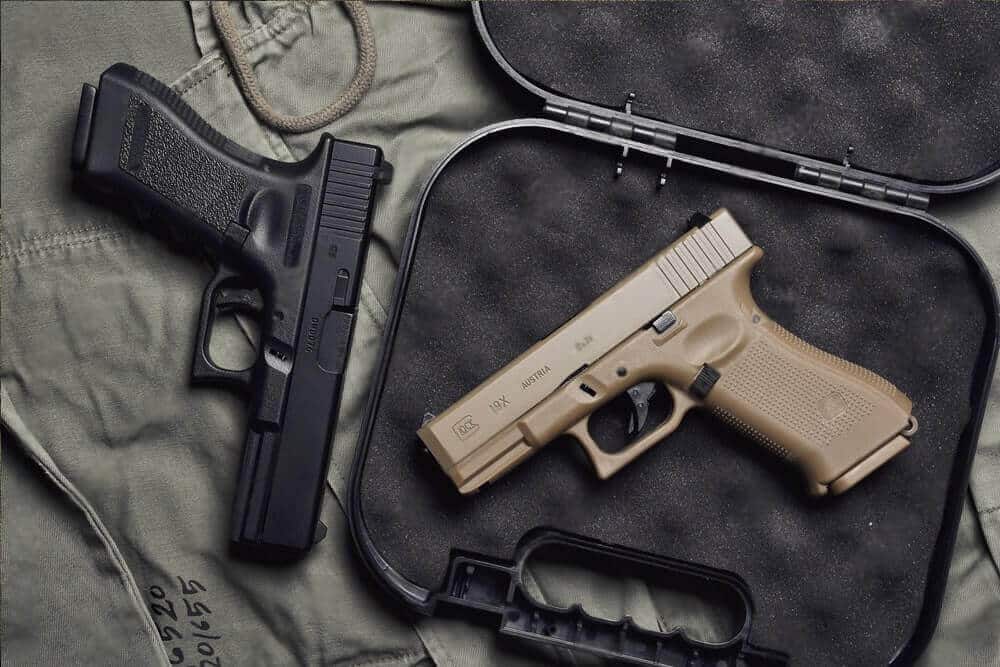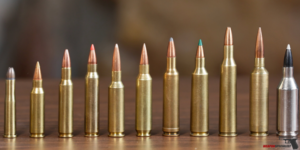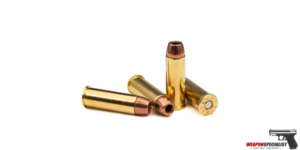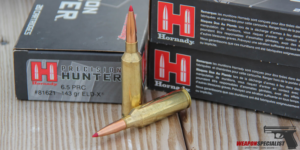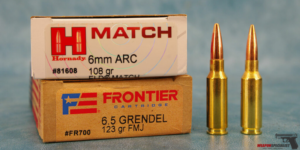The Glock 17 and Glock 19 are two of the most popular semi-automatic pistols in the world, and for good reason.
They are both reliable, accurate, and durable, making them ideal for a variety of uses, including home defense, concealed carry, and competitive shooting.
However, there are some key differences between the two pistols, which may make one a better choice for you than the other.
In this comparison, we will take a look at the key differences between the Glock 17 and Glock 19, so that you can make the best decision for your needs.
Something about the Glock 17
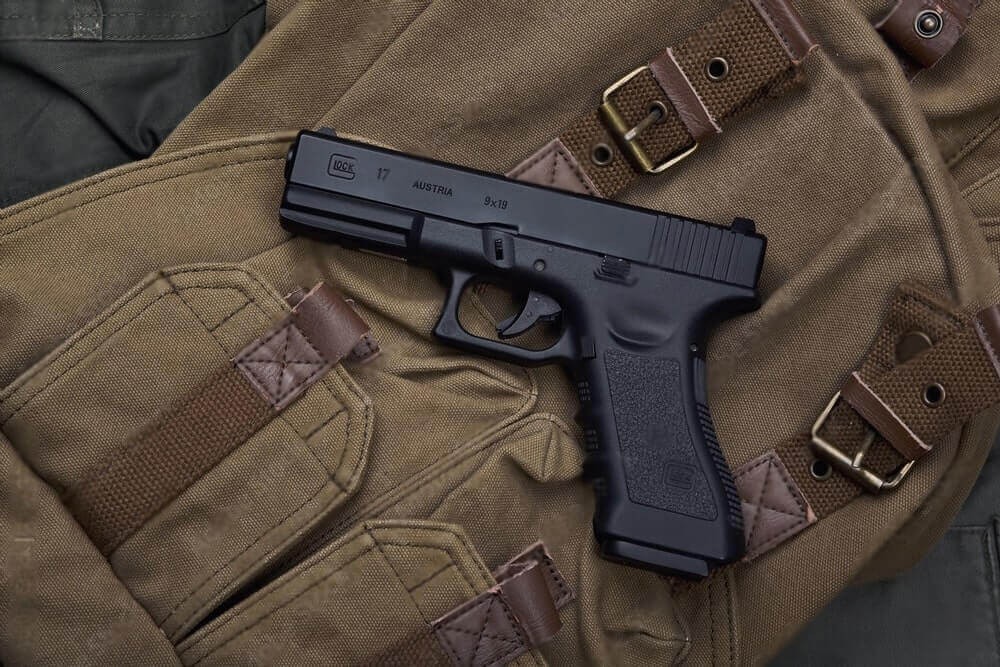
The Glock 17 is a renowned semi-automatic pistol that has earned a reputation for reliability, durability, and widespread adoption among military, law enforcement, and civilian users globally. Manufactured by the Austrian company Glock Ges.m.b.H, it was designed by Gaston Glock in the early 1980s. Here are some key features and characteristics of the Glock 17:
Key Features
- Capacity: The Glock 17 typically has a standard magazine capacity of 17 rounds of 9mm ammunition, making it suitable for various applications, including self-defense and duty use.
- Construction: The frame and slide of the Glock 17 are constructed from polymer, contributing to its durability and resistance to corrosion. The use of polymer also helps reduce the overall weight of the pistol.
- Reliability: Glock pistols are renowned for their reliability. They are known to function effectively even in adverse conditions, and their simple design contributes to a low likelihood of malfunctions.
- Safe Action System: The Glock 17 features Glock’s Safe Action System, a striker-fired mechanism known for its consistent trigger pull and integrated safety features. This system reduces the risk of accidental discharges.
- Aftermarket Support: The Glock 17 enjoys extensive aftermarket support, with a wide range of accessories, modifications, and replacement parts available. This makes it customizable to suit individual preferences and requirements.
- Versatility: Originally designed for military and law enforcement use, the Glock 17 has found popularity among civilian shooters for various purposes, including self-defense, sport shooting, and home protection.
- Global Adoption: The Glock 17 has been adopted by numerous military and law enforcement agencies worldwide. Its widespread use is a testament to its performance and reliability in the field.
Considerations
- Size: The Glock 17 is a full-sized handgun, which may be less ideal for concealed carry compared to more compact models. It is often favored for duty use or open carry.
- Weight: While the polymer construction helps keep the weight reasonable, some users may find the Glock 17 slightly heavier than more compact alternatives.
- Personal Preference: As with any firearm, individual preferences vary. Some users may prefer the larger frame and higher capacity, while others might opt for a more compact option based on their specific needs.
Something about the Glock 19
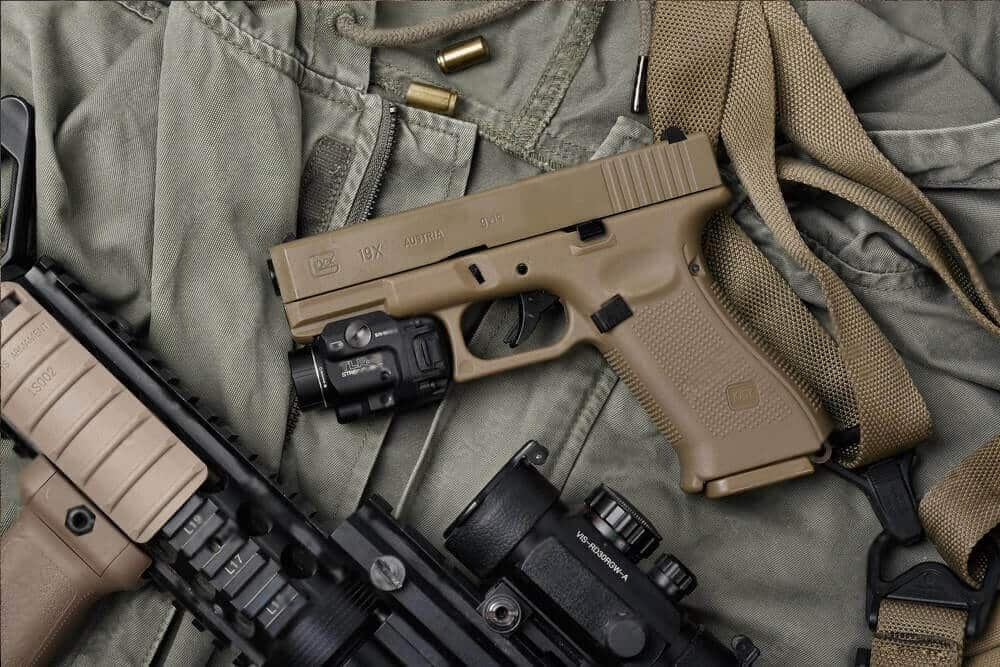
The Glock 19 is a compact, semi-automatic pistol that has earned widespread acclaim for its reliability, simplicity, and versatility. Manufactured by the Austrian company Glock Ges.m.b.H., the Glock 19 is part of the Glock “Safe Action” pistol family, renowned for its innovative design and extensive use of polymer in firearm construction.
Key Features
- Compact Design: The Glock 19 is known for its more compact frame compared to its larger sibling, the Glock 17. This makes it a popular choice for concealed carry, providing a balance between size and capacity.
- Caliber: The Glock 19 is chambered in 9x19mm Parabellum, a widely used and effective cartridge known for its manageable recoil and ample stopping power.
- Capacity: While its magazine capacity is slightly reduced compared to the larger Glock 17, holding 15 rounds in a standard magazine, the Glock 19 remains competitive and can also accept larger magazines from the Glock 17 for increased capacity.
- Reliability: Glock pistols are renowned for their reliability and durability. The Glock 19, like other models in the Glock lineup, is designed with simplicity in mind, featuring fewer components and a straightforward operating mechanism, contributing to its reliability in various conditions.
- Aftermarket Support: The Glock 19 enjoys a vast aftermarket support system, allowing owners to customize and modify their pistols to suit their preferences. This includes a wide range of accessories such as sights, triggers, and grips.
- Versatility: The Glock 19 is a versatile handgun suitable for a variety of purposes, including concealed carry, home defense, and general recreational shooting. Its balance of size, weight, and capacity makes it appealing to a broad spectrum of users.
- Safe Action System: Glock pistols utilize the “Safe Action” system, a unique design featuring a partially cocked striker with three automatic, independently operating mechanical safeties. This system enhances safety while maintaining a consistent trigger pull.
Quick Comparison
| Feature | Glock 17 | Glock 19 |
|---|---|---|
| Size | Slightly larger | Smaller |
| Length | 8.03 inches (204 mm) | 7.36 inches (187 mm) |
| Height | 5.47 inches (139 mm) | 4.99 inches (127 mm) |
| Width | 1.26 inches (32 mm) | 1.26 inches (32 mm) |
| Barrel Length | 4.48 inches (114 mm) | 4.02 inches (102 mm) |
| Capacity | 17 rounds | 15 rounds |
| Weight (unloaded) | Approximately 25.06 oz (710 g) | Approximately 23.65 oz (670 g) |
| Purpose | Full-sized duty pistol | Concealed carry, versatile |
| Concealed Carry | Less suitable due to size | More suitable due to smaller size |
| Ammunition | 9mm Parabellum | 9mm Parabellum |
| Interchangeable Parts | Many parts interchangeable | Many parts interchangeable |
Design
| Compare | Glock 17 Design | Glock 19 Design |
|---|---|---|
| Size |
– The Glock 17 is a full-size pistol, designed for duty use, law enforcement, and general-purpose shooting. – It has a longer barrel and a slightly larger frame compared to the Glock 19. |
– The Glock 19 is a compact pistol, well-suited for concealed carry and personal defense. – It has a shorter barrel and a slightly smaller frame compared to the Glock 17. |
| Barrel Length | Approximately 4.49 inches | Approximately 4.02 inches |
| Capacity | Typically higher magazine capacity compared to Glock 19 | Slightly lower magazine capacity compared to Glock 17, more compact for concealed carry |
Weight & Size
| Parameter | Glock 17 | Glock 19 |
|---|---|---|
| Weight | Approximately 25.06 oz (710 g) (unloaded) | Approximately 23.63 oz (670 g) (unloaded) |
| Length | 8.03 inches (204 mm) | 7.36 inches (187 mm) |
| Height | 5.47 inches (139 mm) | 5.04 inches (128 mm) |
| Width | 1.26 inches (32 mm) | 1.26 inches (32 mm) |
| Barrel Length | 4.49 inches (114 mm) | 4.02 inches (102 mm) |
Ergonomics
| Ergonomic Features | Glock 17 | Glock 19 |
|---|---|---|
| Grip Angle | Consistent, natural point of aim | Consistent, natural point of aim |
| Textured Grip | Secure and comfortable hold | Secure and comfortable hold |
| Interchangeable Backstraps | Yes, for customization of grip size | Yes, for customization of grip size |
| Trigger Safety | Integrated trigger safety mechanism | Integrated trigger safety mechanism |
| Low Bore Axis | Minimizes muzzle rise, faster target acquisition | Minimizes muzzle rise, faster target acquisition |
| Ambidextrous Controls | Reversible magazine release for left-handed shooters | Reversible magazine release for left-handed shooters |
| Individual Differences | Glock 17 | Glock 19 |
|---|---|---|
| Size-Related Ergonomics | Larger frame may be more comfortable for larger hands | More compact size may be preferred for smaller hands or concealed carry |
| Concealed Carry Considerations | Larger size may be less ideal for concealed carry | More compact size often preferred for concealed carry |
| Holster Compatibility | Compatible with various holsters | Compatible with various holsters, more options for concealed carry holsters |
Perfomance
| Aspect | Glock 17 | Glock 19 |
|---|---|---|
| Accuracy | Generally accurate | Accurate; slightly more maneuverable |
| Recoil Control | Good recoil management | Slightly less felt recoil |
| Muzzle Velocity | Slightly higher due to longer barrel | Slightly lower due to shorter barrel |
| Versatility | Versatile for various purposes | More versatile for concealed carry |
| Ammunition Capacity | Larger magazine capacity | Slightly lower capacity |
| User Preference | Subject to individual preferences | Varied based on user preferences |
Concealed Carry Considerations
When considering the Glock 17 and Glock 19 for concealed carry, several factors come into play. Both pistols are popular choices for concealed carry, but their size and weight differences can impact comfort, concealability, and overall suitability for this purpose. Here’s a comparison of concealed carry considerations for the Glock 17 and Glock 19:
| Aspect | Glock 17 | Glock 19 |
|---|---|---|
| Size | Slightly larger frame and longer barrel | Slightly more compact frame and barrel |
| Weight | Generally heavier | Slightly lighter |
| Grip Size | Larger grip may be harder to conceal | Smaller grip may be more concealable |
| Concealment Clothing | May require looser or specific clothing | More adaptable to various clothing types |
| Holster Options | Larger holsters may be required | Wide range of holsters available |
| Capacity | Higher capacity magazines | Slightly lower capacity magazines |
| Comfort | May be less comfortable for some | Generally more comfortable for most |
| Maneuverability | Potentially less maneuverable | Slightly more maneuverable |
Additional Considerations:
- Printing: The larger size of the Glock 17 may lead to more noticeable printing (the outline of the firearm showing through clothing). The Glock 19’s smaller size often makes it easier to conceal without printing.
- Holster Selection: Both pistols have a wide variety of holsters available, but the Glock 19 may have more options .
- Clothing Choices: The Glock 19’s compact size may make it more versatile for concealed carry with a broader range of clothing styles, including lighter and tighter clothing.
- Capacity vs. Comfort Tradeoff: The Glock 17’s higher magazine capacity can be advantageous, but the tradeoff is a slightly larger and potentially less comfortable firearm to conceal.
Pros and Cons
Glock 17
| Pros | Cons |
|---|---|
| Standard capacity of 17 rounds | Larger frame may be less comfortable for some users |
| Longer barrel provides longer sight radius for enhanced accuracy | Less ideal for concealed carry due to its size |
| Generally lower felt recoil due to size | May be less versatile in certain carry situations |
| Well-established platform with extensive aftermarket support | Slightly heavier compared to Glock 19 |
| Suited for duty use and home defense | Slightly higher purchase cost |
Glock 19
| Pros | Cons |
|---|---|
| More compact size, ideal for concealed carry | Slightly reduced magazine capacity (15 rounds) |
| Versatile for both concealed carry and home defense | Shorter sight radius may impact accuracy slightly |
| Slightly lighter, making it more comfortable for carry | May have slightly more felt recoil |
| Can use larger magazines from Glock 17 for higher capacity | Limited in terms of duty use compared to Glock 17 |
| Extensive aftermarket support for accessories | Slightly higher purchase cost compared to some compact handguns |
Generations
Glock 17 Generations
- First Generation (Gen1): Introduced in the 1980s, the original Glock 17 featured a smooth grip without finger grooves and lacked an accessory rail.
- Second Generation (Gen2): Finger grooves were added to the grip, and the accessory rail (for attaching lights and lasers) was introduced. Gen2 models were produced from the early 1990s to the late 1990s.
- Third Generation (Gen3): This generation, introduced in the late 1990s, included an integrated recoil spring assembly, an extractor with a loaded chamber indicator, and additional texture on the grip. The Gen3 models became widely popular.
- Fourth Generation (Gen4): Introduced in 2010, the Gen4 featured a modular backstrap system to adjust grip size, a dual recoil spring for reduced felt recoil, and a larger magazine release button. The Gen4 models also included an updated and more aggressive grip texture.
- Fifth Generation (Gen5): The Gen5, introduced around 2017, included improvements such as an ambidextrous slide release, flared magwell, and a marksman barrel for enhanced accuracy. The finger grooves were removed, and the finish was upgraded.
Glock 19 Generations
- First Generation (Gen1): Introduced alongside the Gen1 Glock 17.
- Second Generation (Gen2): Introduced alongside the Gen2 Glock 17.
- Third Generation (Gen3): Introduced alongside the Gen3 Glock 17, with similar improvements.
- Fourth Generation (Gen4): Introduced alongside the Gen4 Glock 17, sharing the same enhancements.
- Fifth Generation (Gen5): Introduced alongside the Gen5 Glock 17, sharing the same improvements as the Gen5 Glock 17.
FAQs
1. Are there any specific holsters recommended for the Glock 17 or Glock 19?
Numerous holster manufacturers produce models specifically designed for both the Glock 17 and Glock 19. The choice of holster often depends on the user’s preference for carry position (inside or outside the waistband) and other factors like retention level.
2. Can the Glock 19 use magazines from the Glock 17?
Yes, the Glock 19 can use larger magazines from the Glock 17, allowing users to increase their magazine capacity if desired.
3. Which model is better for concealed carry, the Glock 17 or Glock 19?
The Glock 19 is generally considered more suitable for concealed carry due to its more compact size. However, individual preferences and body types can influence this choice.
4. Are Glock 17 and Glock 19 parts interchangeable?
Many parts are interchangeable between the Glock 17 and Glock 19 due to their similar design. However, some components, such as slides and barrels, may not be fully interchangeable without modifications.
5. What is the recommended use for the Glock 17?
The Glock 17 is often used as a duty pistol for law enforcement and military personnel. Its larger size and higher capacity make it well-suited for these roles.
6. Is the Glock 19 a good choice for a first handgun?
Yes, the Glock 19 is often recommended for new handgun owners due to its reliability, simplicity, and versatility. Its size makes it suitable for various applications, including home defense and concealed carry.
7. Can the Glock 19 be used for home defense?
Yes, the Glock 19 is a popular choice for home defense. Its compact size allows for maneuverability in confined spaces, and its magazine capacity provides an ample ammunition supply.
8. How does the recoil compare between the Glock 17 and Glock 19?
The Glock 17 generally has slightly lower felt recoil due to its larger size. However, the difference is often minimal, and personal perception may vary.
Verdict
The Glock 17 and Glock 19 stand as iconic representatives of Glock’s commitment to reliability, simplicity, and versatility in the realm of handguns.
The Glock 17, with its larger frame and extended magazine capacity, excels as a duty pistol and home defense firearm, offering users a robust platform rooted in decades of refinement.
On the other hand, the Glock 19’s more compact size and balanced features make it an excellent choice for concealed carry and a broad range of applications, providing users with adaptability and ease of use.
Both pistols share a lineage marked by continuous improvement across various generations, reflecting Glock’s dedication to meeting the evolving needs of firearm enthusiasts, professionals, and concealed carriers alike.
Whether one leans towards the authoritative presence of the Glock 17 or the concealable efficiency of the Glock 19, both models underscore Glock’s enduring legacy as a pioneer in the field of reliable, polymer-framed handguns.
Last Updated on December 5, 2023 by

